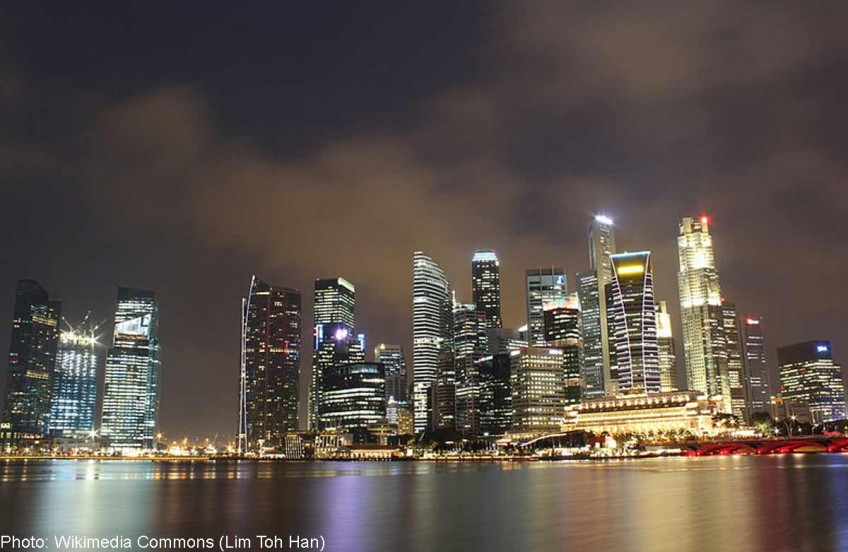Finding Singapore in unexpected places

'Of course I'll apologise, Aphra. What I meant to call you was a preening, sexist, irrelevant and bigoted blob of trans-fat, who bullies her graduate class into posting five-star reviews of her books on Amazon and who was witnessed, on February the tenth at sixteen hundred hours local time, purchasing a Dan Brown novel from the Relay Bookshop at Singapore Changi International airport. Some public-spirited witness has already uploaded the clip onto YouTube, you'll find.'
The audience gasps as one, most gratifyingly.
I also gasped, gratified, when my gaze snagged on "Singapore Changi International Airport" - not the strangest of places for a David Mitchell character to be buying a pulpy book by any means, but pleasantly surprising nevertheless.
This sizzling roast from Mitchell's most recent novel, The Bone Clocks, is certainly not the first time Singapore has been name-checked in fiction, but I'm sure I'm not alone in revelling in that special delight reserved for recognising the little red dot in any sort of writing, film, music, theatre production or artwork not originating from here.
When Haruki Murakami's latest book was released, I'd heard talk that it was a departure of sorts from his usual style and so I bought a copy of Colorless Tsukuru Tazaki And His Years Of Pilgrimage. Then I came across this:
'I think I'll have to go there again sometime soon,' Sara said. 'Have you ever been to Singapore?'
'No, I haven't. Actually I've never been out of Japan. I haven't had any chance to go on an overseas business trip, and traveling abroad by myself always seemed like too much trouble.'
'Singapore's fascinating. The food is amazing and there's a beautiful resort nearby. It'd be nice if I could show you around.'
He imagined how wonderful it would be to travel abroad with her, just the two of them.
I'm not sure I would consider myself the greatest of patriots, but both mentions of Singapore in The Bone Clocks and Colorless Tsukuru Tazaki made me grin, involuntarily, at the double-whammy of recognition. What are the odds that two significant authors releasing new books at about the same time would find it necessary to give Singapore a blink- and-you'd-miss-it cameo? And which of our "beautiful resorts" is this one - perhaps Murakami has been a stealthy visitor to these shores?
(He certainly has been: an acquaintance pointed out that Murakami has written a rather beautifully bizarre piece of short fiction set in Singapore, titled Crabs. No prizes for guessing what delicious platter of food the main characters tuck into, but you might be surprised by what happens next.)
Perhaps it is because we are so small, so seemingly insignificant on a global scale, that an acknowledgement of our presence in an artistic creation works as a strange sort of ego boost.
The works' audiences and readers may not care for a tiny city-state, but we have been bestowed upon them anyway as a surprise gift, a little imprint on their consciousness.
And these cameos, while tiny, also betray a great deal as to how Singapore is perceived - we are often a quirky footnote, a name-drop so far out of left field given the context of the work that it almost affirms the reality of the country itself, since our very existence is a conundrum in the first place: a tiny, strict nation that has somehow managed to claw its way onto the global stage.
Of course, there are references that play blatantly to this "authoritarian" stereotype, but these also elicit a great deal of nudge-wink laughter.
Eighteenth-century Singapore forms the backdrop of the third of the Pirate Of The Caribbean blockbuster movie series, At World's End (2007), with Chow Yun Fat playing a fearsome Singapore pirate lord at odds with Johnny Depp's rakish Jack Sparrow.
Early in the film, actress Keira Knightley's character, Elizabeth, is rescued by Sparrow from a near- drowning - he removes her constricting corset and she coughs up water, very much breathing and alive. "I never would've thought of that," says an onlooking guard, marvelling at Sparrow's ingenuity. "Clearly you've never been to Singapore," the pirate replies.
It's a terrible joke by any standard, but when I caught it on the big screen here, everyone in the cinema was roaring with laughter. Maybe it felt like the joke was made for us, even if the box-office takings from Singapore likely form a negligible fraction of the global market.
Perhaps one of the most famous portrayals of Singapore in writing and film is Paul Theroux's Saint Jack (1973), a novel about a British pimp in Singapore who finds himself tangling with the Chinese mafia.
The resulting 1979 film adaptation by Peter Bogdanovich wasn't deemed palatable by the authorities (the ban has since been lifted) and it's hardly the perfect film. But there is a side of older Singapore, captured from the view of an outsider, that is absolutely fascinating to behold. Beneath that stentorian facade is a seedy world of prostitution, organised crime and blackmail, but a world that still manages to charm.
We are a country of many flaws, but also many fascinating contradictions. And in this constellation of references and settings, from Tom Waits' Singapore to Theroux's Saint Jack, it is gratifying to see that the former cultural desert has become significant enough, or at least idiosyncratic enough, to inspire something in the works of others.
corriet@sph.com.sg
Follow Corrie Tan on Twitter @CorrieTan

This article was first published on Oct 21, 2014.
Get a copy of The Straits Times or go to straitstimes.com for more stories.